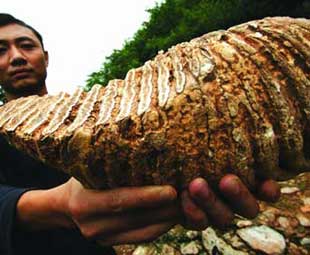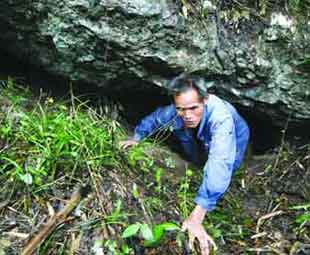Sealed away from the outside world for millions of years, a mountain cave located in Xintian Town, Xuancheng City, southern Anhui Province has recently been excavated and classified by archeologists as a prehistoric cave. It harbors a trove of animal fossil bones and vessels.
A huge crescent fossil bone weighing two kilograms was unearthed during the discovery. Experts have verified it as an Asian elephant tooth, the first one of its kind to be excavated from southern Anhui Province.
Experts have verified it as an Asian elephant tooth, the first one of its kind to be excavated from southern Anhui Province.
The discovery is the direct result of personal efforts by a 57-year-old local villager named Bi Lin.
“I have been excavating the cave since April 2003. Originally I dug it just to create a shelter and rest stop for visitors en route to the temple. But later, I unearthed a heap of fossil bones and vessels from the cave. So my discovery was actually entirely accidental,” he told a reporter from an Anhui-based newspaper. “At first, I didn’t even realize what I had unearthed. Some of my finds were even taken away by visitors. If I hadn’t let them go I’d have had almost a thousand fossils in number,” he said regretfully.
Bi then showed the collected fossils to the reporter, rattling on as if enumerating his family heirlooms.
If not for some alert experts from the Anhui Museum, Bi would never have known a bit of what his finds mean to modern archaeology.
According to Zheng Longting, director of the Cultural Relics Protection Center of Anhui Museum, the cave was formed from the force of erosion caused by underground water sources millions of years ago. When asked where those fossil stones came from, Zheng explained: “They were probably either washed in by water, or left by some prehistoric predatory human beings. The cave’s location serves as evidence that the area must have enjoyed a benign environment and a mild climate that allowed prehistoric human beings to thrive.”
The cave has a narrow entry.
Zheng felt jubilant after he visited the cave, asserting that it was a great archaeological coup. He said: “I hope we can find some prehistoric human traces in our upcoming excavations that are set to start in October.”
The cave is A-shaped and measures some 80 meters in length. Years ago, a rumor circulated among locals that a tiger haunted this cave, making it a quite mysterious place.
(China.org.cn by He Shan, September 7, 2007)



